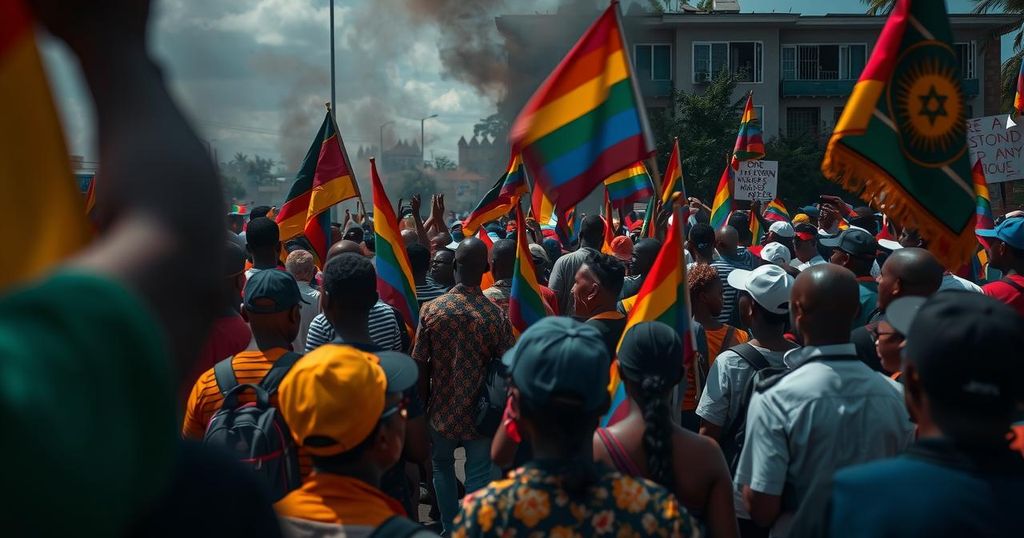Protests Erupt in Mozambique: Calls for Justice Following Election Violence

Protests erupted in Mozambique following the recent election, with security forces killing at least 11 individuals, including Silvio Jeremias. The ruling Frelimo party’s candidate secured a controversial victory, prompting claims of electoral fraud by opposition party Podemos, which contests the election results. The unrest highlights the discontent among a young population eager for political reform and justice.
In Mozambique, protests erupted following the recent election results, which confirmed the ruling Frelimo party’s hold on power for another term. On October 25, in the capital city of Maputo, Silvio Jeremias was tragically killed by live gunfire during a demonstration against the results that showed Frelimo’s presidential candidate, Daniel Chapo, securing 70.7% of the votes amidst widespread allegations of electoral fraud. Human Rights Watch reports that at least 11 individuals were killed by security forces during the protests that took place on October 24 and 25, with 50 others suffering severe injuries from gunfire. The police claimed that any live ammunition fired was directed into the air for crowd control, asserting no intention to inflict harm. Amidst the unrest, opposition party Podemos asserted victory in the election and has since submitted substantial evidence to contest the results, alleging significant irregularities and the manipulation of voter registration. The environment in Mozambique is fraught with tension as civil society groups raise alarms over nearly 900,000 purportedly fraudulent registrations, and local bishops alleged incidents of ballot stuffing. Additionally, ominous patterns of violence against opposition figures have emerged, as evidenced by the recent assassinations of lawyer Elvino Dias and filmmaker Paulo Guambe. Even during a press conference, Venâncio Mondlane, Podemos’ leader, found himself targeted, further highlighting the perilous conditions faced by those opposing the government. The aftermath of Jeremias’ killing has galvanized public sentiment, with mourners expressing a desperate plea for political change and justice, encapsulated by powerful slogans proclaiming the importance of democracy amid the violence. The backdrop of this turmoil is rooted in Mozambique’s longstanding governance by the Frelimo party since its independence in 1975, with the youth increasingly disillusioned with the lack of change in their political landscape. The electoral process, marred by allegations and a climate of fear surrounding opposition activities, suggests a volatile future for Mozambican democracy. As the nation grapples with poverty and political unrest, the determination of the younger demographic to seek accountability and reform appears to be an emerging force. “You can kill me but don’t kill democracy.” – Protest sign at a demonstration. In conclusion, the rising death toll and the outcry against the election results are indicative of a broader discontent with Frelimo’s rule in Mozambique. The events surrounding the protests not only reflect the immediate consequences of the electoral process but also suggest an emerging activism among the youth, demanding both justice for those lost and a commitment to democratic values. The current situation necessitates thorough and impartial investigations into the allegations of electoral fraud and endemic violence against opposition figures, as the country stands at a critical juncture that could redefine its political future.
The recent protests in Mozambique stem from the official election results that have confirmed the ruling Frelimo party’s continued dominance in the political landscape of the country. Since gaining independence in 1975, Frelimo has maintained power, facing increasing scrutiny and allegations of electoral manipulation, particularly from opposition parties such as Podemos. The country’s poverty and youthful demographics have fueled discontent with the current government, leading to heightened tensions during and after the recent election. The protests that followed have resulted in tragic casualties, further igniting calls for justice and political reform among the populace.
The protests in Mozambique, spurred by allegations of electoral fraud, reflect a growing sentiment for change among the citizens, especially the youth. With the tragic loss of lives such as Silvio Jeremias, calls for accountability and the protection of democratic values are louder than ever. The government faces significant pressure to address these grievances and ensure a more transparent electoral process, as the nation stands on the brink of transformative change.
Original Source: www.theguardian.com






